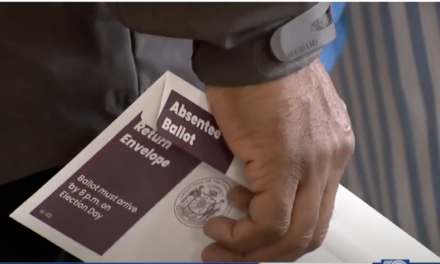We support our Publishers and Content Creators. You can view this story on their website by CLICKING HERE.
Kamala Harris recently made a patronizing stop at a Georgia church as part of the Democrats’ “souls to the polls” campaign. You’ve seen this play before, a Democrat making her rounds to black churches during election season — all smiles, clapping off-beat to gospel music, trying to appear as though she cares about the congregation and, by extension, the Christian faith.
You might, if you’re not careful, briefly mistake her for one of those scary “Christian nationalists” Russell Moore has warned you about. But don’t be fooled: Harris isn’t in the pews because she loves Jesus, believes the gospel, or cares about the welfare of the nation (Jeremiah 29:7). No, rather, her appearance in the Lord’s house is a classic example of political theater, merely leveraging faith for votes. Harris’ church schtick is richer than Nancy Pelosi’s investment portfolio, considering the former’s braggadocios history of hostility toward Christians.
As a senator, she attacked Trump’s judicial nominees (Paul Matey, Brian Buescher, and Peter Phipps) for being members of the Knights of Columbus, suggesting that anyone who affirms Catholic teachings on marriage and abortion is unfit for public office. Perhaps even more alarming, as California’s attorney general, Harris personally oversaw the persecution and raid of Catholic pro-life journalist David Daleiden, who had exposed Planned Parenthood’s sale of aborted baby body parts. This was not an isolated incident. Harris consistently uses her position to target those who stand for biblical values.
Her comments Tuesday in an interview with MSNBC’s Hallie Jackson further display her anti-Christian stance. Harris openly rejected religious exemptions for health care workers who believe abortion is morally wrong. That means, for example, she wants Catholic hospitals and other Christian practitioners to be forced to perform abortions despite their deeply held religious convictions. This is an undeniable assault on religious freedom, targeting anyone who refuses to bow to her cult of death.
Furthermore, Harris and running mate Tim Walz’s support for abortion until birth only highlights their willingness to attack the sanctity of life — one of the most foundational tenets of the Christian faith.
Harris’ policy positions are not just rhetoric; they reflect a deeply ingrained opposition to Christian values. For example, she has championed the Equality Act, which, under the guise of “anti-discrimination,” would force Christian schools, charities, and businesses to violate their beliefs on marriage, sexuality, and the sexes. Thankfully, this egregious piece of legislation failed to become law in 2021 due to a lack of bipartisan support in the Senate, but a Harris-Walz administration would likely bring it back — and might even support nuking the Senate filibuster to ram it through Congress.
Just days before Harris’ performative Georgia church visit, she headlined a Wisconsin college rally and showed how reflexively she mocks Christianity. When two students chanted, “Jesus is Lord” and “Christ is King,” her response was to sneer, “You’re at the wrong rally,” followed by her witch-like cackle. It’s obvious she hates Christians — or at least the kind who don’t serve her political ambitions.
Christians must not be naive. It’s not enough for a parasitic politician to show up at our churches, making hollow references to faith. We can’t hand out our votes so easily (regardless of what Ray Ortlund might say). And if your church leaders invite a pagan priestess like Harris (or your pastor endorses one), maybe it’s time to find a new church.
Kamala Harris has shown time and time again how willing she is to undermine everything faithful believers stand for. Christian, when you exercise your civic duty, don’t just remember who she is. Remember who you are: a redeemed slave to King Jesus. Christ is, indeed, King. Vote accordingly.
Mikale Olson is a writer, podcaster, and YouTuber with experience in conservative political activism and commentary. His work delves into the intersection of faith, politics, and culture from a Christian conservative perspective.

 Conservative
Conservative  Search
Search Trending
Trending Current News
Current News 





